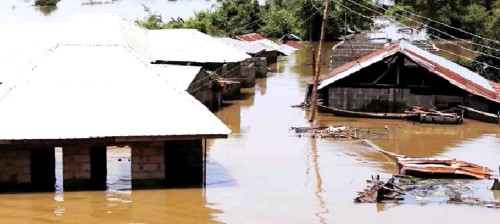The Nigerian Medical Association on Wednesday raised the alarm over the floods across Nigeria, warning the country was at a high risk of waterborne diseases.
The President of the NMA, Dr Uche Ojinmah, in an interview with The Punch, lamented that corpses were floating in floods, adding that the government should swing into action to prevent an epidemic.
The United Nations International Children’s Emergency Fund had a few days ago, said the floods, which had affected 34 out of the 36 states in the country, had displaced 1.3 million people.
The UN body said over 600 people had lost their lives, adding that over 200,000 houses had either been partially or fully damaged.
The NMA president further stated that there were high risks of waterborne diseases in the country as a result of the floods.
Ojinmah said, “The wells and streams are already contaminated so there is a risk of waterborne diseases, especially in the affected states.
“Corpses are floating in the floods, especially in Bayelsa. The government needs to provide good camping, toilets, water and healthcare for them because they will need to be attended to medically for their health needs.”
Also, the President of the Nigerian Association of Resident Doctors, Dr Emeka Orji, told The PUNCH that there were immediate and future implications and threats of the floods in the country.
“I must confess that we’ve not conducted any study to find out the effects of flooding in the country. Unfortunately, floods can lead to waterborne diseases like diarrhoea, cholera, and typhoid fever.
“The state and federal governments must proffer preventive measures to prevent this disaster from reoccurring. Usually, there’s a warning that the flooding was going to happen but if we have an adequate emergency response team, this would have been prevented. So, I blame the state and federal governments.
FCT NMA
The Public Relations Officer of the Nigerian Medical Association in the FCT, Dr Muyiwa Komolafe, on his part said the floods would lead to pollution and waterborne diseases.
He said “Floods are not a new thing but this year’s case is high and it will definitely pollute the ground waters. That of this year is astronomical because of the water released from the dam. But we could have averted the disasters because we have forecasters that have predicted this.
“There will be pollution because most filling stations have their fuel reservoirs underground. Don’t forget that toilets and septic tanks are there, so it is certain that there will be waterborne diseases like cholera, and typhoid and anybody around the waters is at risk.
“I will blame both the government and the people because there were predictions earlier.’’
A former President of the Association of Resident Doctors, Niger Delta University Teaching Hospital chapter, Bayelsa State, Dr Oru-Oru Inestol, said the massive flooding could pre-dispose the populace to the outbreak of water-borne diseases.
The Secretary of the Gombe State Chapter of the NMA, Dr Daniel Apollos, in an interview with one of our correspondents in Gombe said there were health concerns, especially cholera.
Meanwhile, the governor of Akwa Ibom State, Udom Emmanuel, on Wednesday, commiserated with his Bayelsa counterpart, Douye Diri, over the flood situation in his state.
Emmanuel, who led a delegation of his cabinet members to the Government House, Yenagoa, said his cabinet decided to visit Bayelsa based on the magnitude of the flood that hit the state.
Describing the natural disaster as pathetic, he applauded the relentless efforts of Diri in standing by his people in their moment of despair, stressing that his gesture was a mark of true leadership.
Emmanuel, therefore, presented a cheque of N100m to Diri and also announced that a truckload of relief materials courtesy of his wife’s Family Empowerment Programme Foundation was on its way to support flood victims in the state.
Lagos floods
In Lagos State, the state government, on Wednesday, said the flood incident at Oko Oba, in the Agege area of the state, was caused by property owners in the community.
The state Commissioner for the Environment and Water Resources, Tunji Bello, who made this known in his reaction to a viral video clip, added that all the affected structures were on a drainage channel alignment.
Bello said, “Contrary to impressions being created, the area which is behind Abimbola Awoniyi Estate by Agric Road, Oko Oba, Agege has always experienced a flash flood.
“The pictures which were taken two hours after the rain showed the culpability of the property owners who have limited the capacity of the Oko Oba channel by infringing on its setback and the pictures also showed the extent to which the setback has been turned into a refuse dump by the residents as well as new constructions.”
Also on Wednesday, the Gombe State government received items worth millions of naira from the North-East Development Commission to cushion the effect of the flood disaster which ravaged some parts of the state.
The items, which include rice, mats, shades materials, blankets, and dresses were presented to the state government by the Representative of the Minister of Humanitarian Affairs and Disaster Management in the company of the Managing Director, North East Development Commission at their Central Stores, Bogo in the Metropolis.
10,000 households
The Chairman of Ndokwa East Local Government Area of Delta State, Juan Governor, disclosed that a total of 10,611 households across impacted communities in the locality were displaced by the current ravaging flood.
The chairman, who disclosed this in his regular flood impact summary on Wednesday, said all the farmlands in the locality were devastated beyond remedy.
He said roads and other critical infrastructure, including the council secretariat in Aboh, were also submerged, as earlier reported.
The governor disclosed that the council so far received N1,500,000.00 in donations, which were lodged in the council’s account and earmarked for post-flood management plans.
In a related development, the government’s poor response and deaths caused by the flood sparked anger on Wednesday.
The All Progressives Congress in Bayelsa State sympathised with the people of the state over the loss of lives and extensive destruction caused by the recent floods in the state.
It berated the Diri-led administration for not making adequate preparations, stating that the effects of the flooding would have been reduced if the state government put measures in place.
The APC, in a statement signed by its State Publicity Secretary, Doifie Buokoribo, on Wednesday said the natural catastrophe reached almost every part of the state and caused large-scale damage to livelihoods.
An environmental analyst, Mr Michael Simire, during a phone interview with our correspondent, said the government at all levels was to blame for the damage caused by the flood and the loss of lives.
He said, “This was largely the fault of the government at all levels because the flood was majorly caused by the Lagdo dam in Cameroon that was opened, resulting in the flood. This flooding incident had already occurred about 10 or 11 years ago and the poor response of the government has been the same. The Federal Government ought to have constructed a dam that would contain the effect of the opening of the Lagdo dam but they did nothing.
“The FG through the Minister of Water Resources, Suleiman Adamu, claimed that the Cameroon dam played a little role in the flood and that it was more a problem with the tributaries. Even that excuse is not strong enough to justify the inaction of the government.
There should have been proactive measures put in place over the years and even the state governments should have sensitised and alerted the people who resided in the vulnerable areas. There were annual predictions made by the Nigerian Metrological Agency which the state governments should have heeded because they predicted the flood. Nothing was done and it is worrisome.”
Another environmentalist, Mr Greg Udogwu said that the flood wouldn’t have been severe if the government had prepared in advance through the construction of a dam since the 1970s.
He said, “Flooding is a natural disaster but it could have been well utilised, for example for irrigation of agricultural farms, but that entails a plan in place. In 1977 or thereabout the Nigerian government embarked on a dam but it was abandoned by 1982 and this was why up till today the effect of the opening of the Lagdo dam in Cameroon was so massive.
“If that dam had been constructed, it would have contained that water that came when the water from their dam was released. They released the water due to climate change and high rainfall which increased the water level but our country had no means of containing it. In 2012, over 300 lives were lost but this year it is over 600 because we have entered another phase of climate change and we now have more rainfall.
“So, I will blame the failure of the government to make use of the River Niger, Benue and the river in Taraba to effective use and here, flooding has now become a curse when we consider the damage done and the lives lost. This is why President Muhammadu Buhari ordered the Minister of Water Resources to come up with a plan, unfortunately, I think the 90 days is too long.”
Credit: The Punch

 BIG STORY3 days ago
BIG STORY3 days ago
 BIG STORY4 days ago
BIG STORY4 days ago
 BIG STORY3 days ago
BIG STORY3 days ago
 BIG STORY4 days ago
BIG STORY4 days ago
 BIG STORY4 days ago
BIG STORY4 days ago
 BIG STORY13 hours ago
BIG STORY13 hours ago
 BIG STORY2 days ago
BIG STORY2 days ago
 BIG STORY1 day ago
BIG STORY1 day ago






















